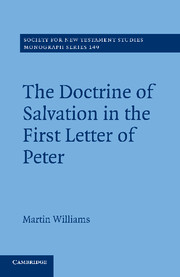Book contents
- Frontmatter
- Contents
- Preface
- Abbreviations
- Introduction
- Part I Methodology
- Part II Literal Sense Exegesis
- 2 Chosen for salvation
- 3 The provision of salvation
- 4 Rebirthed unto salvation
- 5 The expectation of salvation
- 6 Salvation as future victory and vindication
- Part III Intercatholic conversation
- Conclusion
- Bibliography
- Index of names
- Index of References
5 - The expectation of salvation
salvation as a future event
from Part II - Literal Sense Exegesis
Published online by Cambridge University Press: 05 November 2011
- Frontmatter
- Contents
- Preface
- Abbreviations
- Introduction
- Part I Methodology
- Part II Literal Sense Exegesis
- 2 Chosen for salvation
- 3 The provision of salvation
- 4 Rebirthed unto salvation
- 5 The expectation of salvation
- 6 Salvation as future victory and vindication
- Part III Intercatholic conversation
- Conclusion
- Bibliography
- Index of names
- Index of References
Summary
Context
1 Peter 1:3–12 forms one unbroken sentence in the Greek and constitutes the first main division of the letter. The main body of the letter opens (1:3–12) on a note of praise and blessing (εὐλογητός; cf. Eph. 1:3; 2 Cor. 1:4). Theologically, this opening blessing continues the theme of the opening salutation (1:1–2) which highlights God’s sovereign and saving initiative and grace in the lives of believers. The main theme of the present section (1:3–12) is introduced immediately in v. 3: God is to be praised and thanked for his divine mercy and saving work. The main theme of this passage then is salvation. Significantly, the term σωτηρία (‘salvation’) itself appears only four times in 1 Peter, and yet three of these occurrences are in this section (1:5, 9, 10; the fourth occurrence is found in 2:2), and in all three cases they are with reference to salvation as a future event. The overall message of 1:3–12 may be summarised as follows: ‘Believers have been reborn to an entirely new life that is characterised by hope and joy and that is destined for glory and final salvation.’
Furthermore, it has been clearly demonstrated that this opening section functions as an introduction to the entire letter by anticipating themes in succeeding sections of the letter. 1 Peter 1:3–12 serves as an introduction to 1:13–5:11 in two basic ways. First, the terminology and motifs of 1:3–12 anticipate themes that will be developed in succeeding sections of the letter. Second, in a more general way 1:3–12 serves as a presupposition for 1:13–5:11. That is to say, 1:3–12 serves as the theological ‘foundation upon which the author bases his exhortations’. As we have noted above and I will argue below, the main theme of 1:3–12 is salvation. The salvation described (or better, exulted in) here ‘requires a distinctive way of life (ἀναστροϕή) and the author’s concern in 1:13–5:11 is to encourage his readers in this way’ (hence the change from the indicative in 1:3–12 to the imperative in vv. 13f., signalled by the consecutive conjunction διό [‘therefore’] in v. 13). This being the case, the theme of salvation is not only prominent in the opening section of this letter but in fact pervades the entire letter.
- Type
- Chapter
- Information
- The Doctrine of Salvation in the First Letter of Peter , pp. 149 - 187Publisher: Cambridge University PressPrint publication year: 2011



